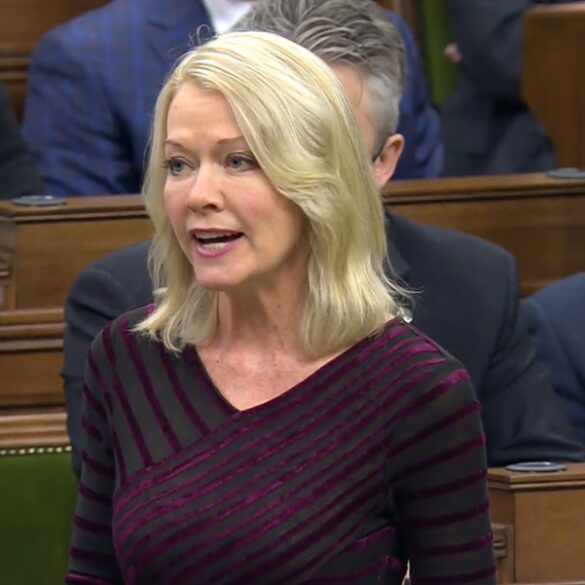
Interim Leader of the Conservative Party Candice Bergen rises during Question Period in the House of Commons on Parliament Hill in Ottawa on Feb. 7, 2022. (Screenshot/Parliamentary Proceedings)
Bias in the coverage of some media is tilting the political playing field in Canada and constitutes the “hardest thing” to contend with in political life, says Conservative Party interim leader Candice Bergen.
“I’ve been doing this job now for 14 years and I can tell you the hardest thing that I deal with on a regular basis is the fact that the mainstream media, … many in Ottawa of the Press Gallery, not all, but many of them—are really just a communications arm of the Liberal Party,” Bergen told The Epoch Times in an interview on May 9.
Bergen said that rather than holding the sitting government to account, “they do a very good job of holding [the] opposition to account.”
“We don’t mind being asked tough questions, we don’t mind having our policy challenged, but we just want to get a fair shake,” she said.
Bergen alluded to loyalty among some outlets being influenced by media subsidies but suggested the relationship is not only financial but personal as well.
“[In] many cases they’re friends, they holiday together, they spend time together. So that is just a fact that we as Conservatives have had to deal with,” she said.
The federal government announced in 2018 a $595 million package over five years to help the country’s media industry, and other support programs amounting to tens of millions in funding.
Bergen noted in recent years her party has benefitted from the growth of independent media and social media in particular, where MPs can communicate directly with Canadians.
“I think legacy media, corporate media, whatever you want to call it—they’re just becoming more and more irrelevant every single day,” she said.
The slogan “Defund the CBC” has been touted among some candidates on the Conservative Party leadership campaign trail, but Bergen hinted she would go further by getting rid of media subsidies.
“I look forward to the day when we win government and if media can’t compete they won’t be getting a bunch of government money,” she said.
In Canada, media outlets must be approved by the Canada Revenue Agency (CRA) as a “qualified Canadian journalism organization” (QCJO) in order to be eligible for federal tax credits and other programs, with part of that review process undertaken by a government-appointed independent advisory board.
Last month, independent media Rebel News said it was suing the CRA after being denied QCJO status on the grounds it doesn’t produce “original news content.”
